2024
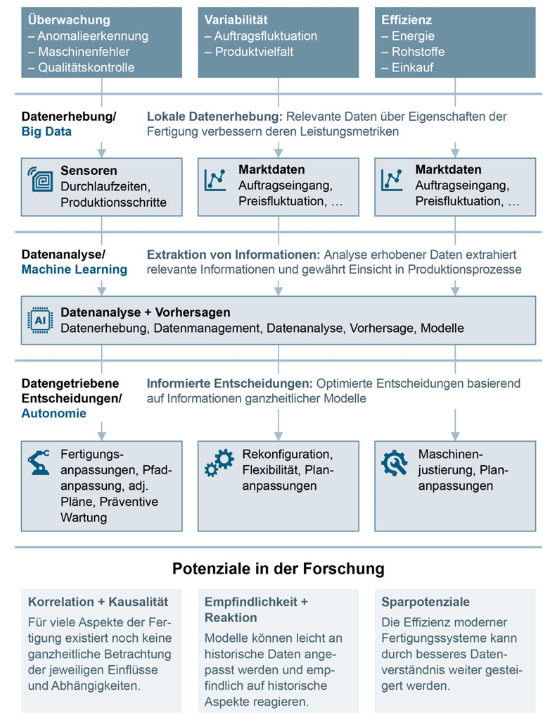
Julia C. Arlinghaus; Oliver Antons
Planung und Steuerung für die digitale Produktion Book Chapter
In: Berlin Springer Vieweg, Heidelberg (Ed.): Handbuch Unternehmensorganisation, Springer Vieweg, Berlin, Heidelberg, 2024, ISBN: 978-3-642-45370-0.
Abstract | Links | BibTeX | Tags: Autonomous production control, Autonomy & Decision-making Authority, Cyber-physical system, Digitalization, Industry 4.0, Production planning and control, Smart manufacutring systems
@inbook{Arlinghaus2024,
title = {Planung und Steuerung f\"{u}r die digitale Produktion},
author = {Julia C. Arlinghaus and Oliver Antons},
editor = {Springer Vieweg, Berlin, Heidelberg},
url = {https://link.springer.com/referenceworkentry/10.1007/978-3-642-45370-0_63-2},
doi = {10.1007/978-3-642-45370-0_63-2},
isbn = {978-3-642-45370-0},
year = {2024},
date = {2024-07-01},
urldate = {2024-07-01},
booktitle = {Handbuch Unternehmensorganisation},
publisher = {Springer Vieweg, Berlin, Heidelberg},
abstract = {Im vergangenen Jahrzehnt wurde die produzierende Industrie mit einem zunehmend volatileren Umfeld konfrontiert. Unterschiedlichste Krisen haben etablierte Lieferketten ersch\"{u}ttert und die Notwendigkeit resilienter und flexibler Produktionsplanung und -steuerung aufgezeigt. Zeitgleich hat eine voranschreitende Digitalisierung der Produktionsanlagen neue Herausforderungen, Potenziale und Chancen aufgeworfen. Cyber-physikalische Systeme und ein Industrial Internet of Things erm\"{o}glichen Digitale Zwillinge der Produktion und erf\"{u}llen die technischen Voraussetzungen f\"{u}r eine autonome Entscheidungsfindung auf einzelnen Produktionssystemen. In diesem Kontext stellt sich f\"{u}r Unternehmen eine fundamentale Frage der Organisation hinsichtlich der Architektur von Produktionsplanung und -steuerung. Mit zentralisierter sowie verteilter Produktionsplanung und -steuerung stehen Unternehmen zwei gegenl\"{a}ufige Ans\"{a}tze zur Verf\"{u}gung, die in diesem Beitrag n\"{a}her betrachtet werden.},
keywords = {Autonomous production control, Autonomy \& Decision-making Authority, Cyber-physical system, Digitalization, Industry 4.0, Production planning and control, Smart manufacutring systems},
pubstate = {published},
tppubtype = {inbook}
}
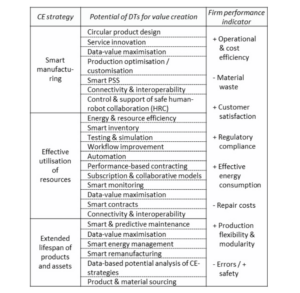
Rodrigo Torres Adelsberger; Oliver Antons; Julia Arlinghaus
Digital Twins and their Implications for Business Models: Overview and Potentials Journal Article
In: IFAC-PapersOnLine, vol. 58, no. 19, pp. 409-414, 2024, ISSN: 2405-8963, (18th IFAC Symposium on Information Control Problems in Manufacturing INCOM 2024).
Abstract | Links | BibTeX | Tags: Business Model, Circular Business Model, Circular Economy, Digital Twin, Digital Twin-enabled Business Model, Industry 4.0, Servitisation, Smart Product-Service System
@article{ADELSBERGER2024409,
title = {Digital Twins and their Implications for Business Models: Overview and Potentials},
author = {Rodrigo Torres Adelsberger and Oliver Antons and Julia Arlinghaus},
url = {https://www.sciencedirect.com/science/article/pii/S2405896324016756},
doi = {https://doi.org/10.1016/j.ifacol.2024.09.246},
issn = {2405-8963},
year = {2024},
date = {2024-01-01},
urldate = {2024-01-01},
journal = {IFAC-PapersOnLine},
volume = {58},
number = {19},
pages = {409-414},
abstract = {Digital Twins are key elements to develop the complex digital systems required for an effective Circular Economy transition. This study explores the intersection of Digital Twins and Business Models within Industry 4.0 and offers a comprehensive theoretical background of the advancements in Digital Twins and their potentials to innovate Business Models. Through a literature review, we identify and discuss eleven Digital Twin-enabled Business Models. The study suggests the necessity of further research efforts to validate theoretical perspectives and identifies future research venues, such as the exploration of Digital Twin-enabled Circular Business Models.},
note = {18th IFAC Symposium on Information Control Problems in Manufacturing INCOM 2024},
keywords = {Business Model, Circular Business Model, Circular Economy, Digital Twin, Digital Twin-enabled Business Model, Industry 4.0, Servitisation, Smart Product-Service System},
pubstate = {published},
tppubtype = {article}
}
2022
Julia C. Arlinghaus; Oliver Antons
Management for Digitalization and Industry 4.0 Book Chapter
In: Berlin Springer, Heidelberg (Ed.): vol. Handbook Industry 4.0, pp. 927-948, 2022.
Abstract | Links | BibTeX | Tags: Digitalization, Industry 4.0
@inbook{Arlinghaus2022,
title = {Management for Digitalization and Industry 4.0},
author = {Julia C. Arlinghaus and Oliver Antons},
editor = {Springer, Berlin, Heidelberg},
url = {https://doi.org/10.1007/978-3-662-64448-5_49},
doi = {10.1007/978-3-662-64448-5_49},
year = {2022},
date = {2022-06-23},
urldate = {2022-06-23},
volume = {Handbook Industry 4.0},
pages = {927-948},
abstract = {Global trends are changing how and what European companies manufacture. Progressive globalization and constant and immediate availability of relevant information through the Internet are not only changing the structure of global value networks but also compelling companies to operate under increasingly intense time, quality, innovation and cost pressure. Hence, the associated complexity of products, value networks and the planning and control processes is consequently growing. European companies are thus facing numerous seemingly conflicting challenges that their respective management has to reconcile.},
keywords = {Digitalization, Industry 4.0},
pubstate = {published},
tppubtype = {inbook}
}
2021

Oliver Antons; Julia C. Arlinghaus
Distributing decision-making authority in manufacturing – review and roadmap for the factory of the future Journal Article
In: International Journal of Production Research, vol. 60, iss. 13, no. 0, pp. 1-19, 2021.
Abstract | Links | BibTeX | Tags: Autonomous production control, Autonomy, Autonomy & Decision-making Authority, Decentralized Control, Industry 4.0, Production planning and control
@article{Antons2021Distributing,
title = {Distributing decision-making authority in manufacturing \textendash review and roadmap for the factory of the future},
author = {Oliver Antons and Julia C. Arlinghaus},
url = {https://doi.org/10.1080/00207543.2022.2057255},
doi = {10.1080/00207543.2022.2057255},
year = {2021},
date = {2021-07-27},
urldate = {2021-07-27},
journal = {International Journal of Production Research},
volume = {60},
number = {0},
issue = {13},
pages = {1-19},
publisher = {Taylor \& Francis},
abstract = {The question of the benefits of autonomous control is more important than ever: production managers, governments and society hope that the vision of smart and digital production systems with high flexibility and low costs may save the value adding and therefore welfare in the high wage, industrialised countries. At the same time, the discussion on the social implications of autonomous objects and decentralised control approaches is growing. Looking back on the history of production research and practice, we find that there has been a constant ply among scholars and production managers between the advantages of the two concepts of centralised and decentralised control approaches. In this article, we study the concept of autonomy in production planning and control, enabled by cyber-physical systems and the distribution of decision-making authority. Based on a profound structured literature review, we analyse the perception of autonomy, the technological requirements and the increasing complexities of modern smart manufacturing. Moreover, we find that recently several research streams suggest the advantages and benefits of autonomous control concepts compared to traditional centralised approaches based on qualitative analysis and identify a distinct lack of quantitative results.},
keywords = {Autonomous production control, Autonomy, Autonomy \& Decision-making Authority, Decentralized Control, Industry 4.0, Production planning and control},
pubstate = {published},
tppubtype = {article}
}

Oliver Antons; Julia C. Arlinghaus
Adaptive self-learning distributed and centralized control approaches for smart factories Proceedings Article
In: pp. 1577-1582, 2021, ISSN: 2212-8271, (54th CIRP CMS 2021 - Towards Digitalized Manufacturing 4.0).
Abstract | Links | BibTeX | Tags: Autonomy, Autonomy & Decision-making Authority, Cyber-physical system, Data analytics, Decision-making, Discrete-event simulation, Distributed control, Industry 4.0, Multi-agent system, Self-learning, Smart factory
@inproceedings{ANTONS20211577,
title = {Adaptive self-learning distributed and centralized control approaches for smart factories},
author = {Oliver Antons and Julia C. Arlinghaus},
url = {https://www.sciencedirect.com/science/article/pii/S2212827121011641},
doi = {https://doi.org/10.1016/j.procir.2021.11.266},
issn = {2212-8271},
year = {2021},
date = {2021-01-01},
urldate = {2021-01-01},
journal = {Procedia CIRP},
volume = {104},
pages = {1577-1582},
abstract = {The increasing application of cyber-physical systems creates a manufacturing environment in which the technical requirements for distributed control approaches, self-learning systems and analytics of previously untapped data are given. While distributed control approaches are capable to evaluate this information locally and react immediately, centralized approaches react inertly to analyzed machine performance data. In this paper, we study the performance and ability to address the ever increasing challenges in industry of both types of control approaches within an established multi-agent based discrete event simulation.},
note = {54th CIRP CMS 2021 - Towards Digitalized Manufacturing 4.0},
keywords = {Autonomy, Autonomy \& Decision-making Authority, Cyber-physical system, Data analytics, Decision-making, Discrete-event simulation, Distributed control, Industry 4.0, Multi-agent system, Self-learning, Smart factory},
pubstate = {published},
tppubtype = {inproceedings}
}
2020
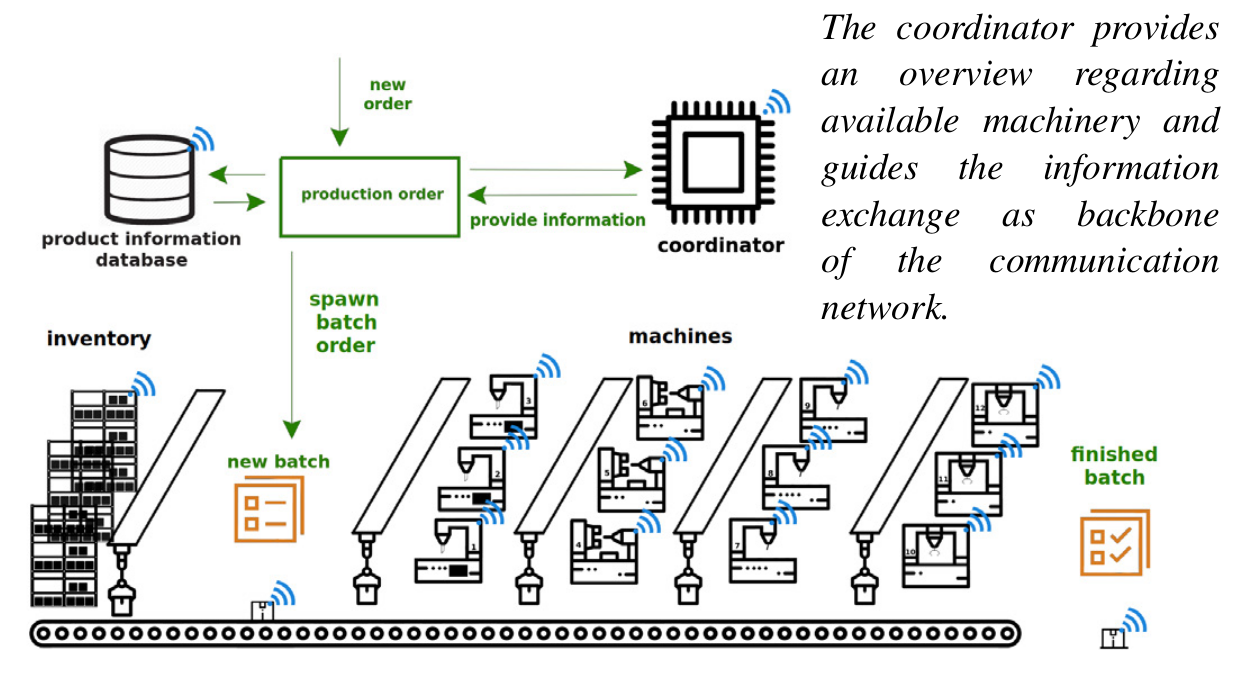
Oliver Antons; Julia C. Arlinghaus
Designing decision-making authorities for smart factories Proceedings Article
In: pp. 316–322, Elsevier, 2020.
Abstract | Links | BibTeX | Tags: Autonomy, Autonomy & Decision-making Authority, Cyber-physical system, Decision-making, Discrete-event simulation, Distributed control, Industry 4.0, Intelligent Product, Multi-agent system, Smart factory
@inproceedings{antons2020designing,
title = {Designing decision-making authorities for smart factories},
author = {Oliver Antons and Julia C. Arlinghaus},
url = {https://www.sciencedirect.com/science/article/pii/S2212827120306120},
doi = {10.1016/j.procir.2020.04.047},
year = {2020},
date = {2020-01-01},
urldate = {2020-01-01},
journal = {Procedia CIRP},
volume = {93},
pages = {316--322},
publisher = {Elsevier},
abstract = {Smart factories are an appealing vision, addressing ever increasing challenges in industry. Driven by advances in microcontroller, sensor and networking technologies, all entities, such as machines, products, load carriers, within a smart factory could become intelligent and able to assess their own situation and to attain their own goals successfully. However, local decision may exacerbate achieving global logistics performance due to the entities intrinsic selfishness. In this paper, we explore the trade-off between local decision-making and global performance management and derive first guidelines for the situation-specific design of a distributed control authority for smart factories.},
keywords = {Autonomy, Autonomy \& Decision-making Authority, Cyber-physical system, Decision-making, Discrete-event simulation, Distributed control, Industry 4.0, Intelligent Product, Multi-agent system, Smart factory},
pubstate = {published},
tppubtype = {inproceedings}
}

Ziqi Zhao; Oliver Antons; Julia C. Arlinghaus
Autonomous Production Control Methods-Job Shop Simulations Proceedings Article
In: International Conference on Dynamics in Logistics, pp. 227–235, Springer 2020.
Abstract | Links | BibTeX | Tags: Autonomous production control, Industry 4.0, Production planning and control
@inproceedings{zhao2020autonomous,
title = {Autonomous Production Control Methods-Job Shop Simulations},
author = {Ziqi Zhao and Oliver Antons and Julia C. Arlinghaus},
url = {https://link.springer.com/chapter/10.1007/978-3-030-44783-0_22},
doi = {10.1007/978-3-030-44783-0_22},
year = {2020},
date = {2020-01-01},
urldate = {2020-01-01},
booktitle = {International Conference on Dynamics in Logistics},
pages = {227--235},
organization = {Springer},
abstract = {With the development of Industry 4.0 and the Internet of Things, autonomous production control is regarded as a feasible and promising approach for meeting the increasing challenges of complexity and flexibility. To implement autonomous production control methods in the practice, a deeper understanding of their characteristics is necessary. This research provides a comparative perspective on existing methods. We study selected autonomous production control methods under various scenarios, and derive insights for the design of such systems in industrial practice.},
keywords = {Autonomous production control, Industry 4.0, Production planning and control},
pubstate = {published},
tppubtype = {inproceedings}
}
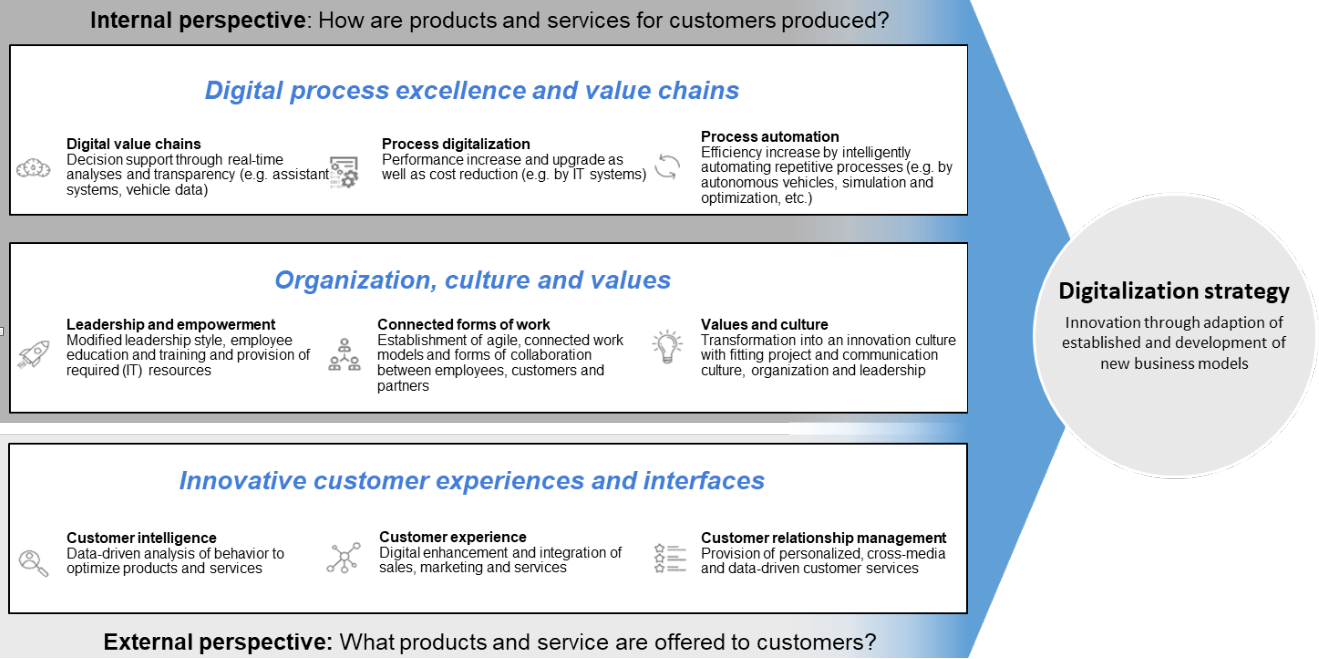
Julia C. Arlinghaus; Oliver Antons
Management für Digitalisierung und Industrie 4.0 Book Chapter
In: Handbuch Industrie 4.0: Recht, Technik, Gesellschaft, pp. 1121–1145, Springer, 2020.
Abstract | Links | BibTeX | Tags: Digitalization, Industry 4.0
@inbook{arlinghaus2020management,
title = {Management f\"{u}r Digitalisierung und Industrie 4.0},
author = {Julia C. Arlinghaus and Oliver Antons},
url = {https://link.springer.com/chapter/10.1007/978-3-662-58474-3_58},
doi = {10.1007/978-3-662-58474-3_58},
year = {2020},
date = {2020-01-01},
urldate = {2020-01-01},
booktitle = {Handbuch Industrie 4.0: Recht, Technik, Gesellschaft},
pages = {1121--1145},
publisher = {Springer},
abstract = {Globale Trends ver\"{a}ndern wie und was europ\"{a}ische Unternehmen produzieren. Die fortschreitende Globalisierung und die permanente und direkte Verf\"{u}gbarkeit relevanter Informationen durch das Internet beeinflussen aber nicht nur die Struktur der globalen Wertsch\"{o}pfungsnetzwerke, sondern zwingen Unternehmen auch, unter immer gr\"{o}\sserem Zeit-, Qualit\"{a}ts-, Innovations- und Kostendruck zu arbeiten. Infolgedessen steigt die Komplexit\"{a}t der Produkte, der Wertsch\"{o}pfungsnetze und der dahinterliegenden Planungs- und Steuerungsprozesse. Vor diesem Hintergrund ist die unter dem Begriff "Industrie 4.0" zusammengefasste Vision zu einem Hoffnungstr\"{a}ger f\"{u}r die europ\"{a}ische Wirtschaft geworden. Dabei reicht diese Vision l\"{a}ngst \"{u}ber den Ursprung des Begriffs \textendash einer digitalisierten, intelligenten Fabrik \textendash hinaus und umfasst nahezu alle Gesch\"{a}ftsbereiche. Der damit f\"{u}r Unternehmen essenzielle Wandlungsprozess wird dabei meist als "Digitale Transformation" bezeichnet. Dabei handelt es sich jedoch nicht um eine einmalige Anpassung mit klarem Anfangs- und Endpunkt, sondern um einen fortw\"{a}hrenden Anpassungsprozess, den jedes Unternehmen f\"{u}r sich spezifisch gestalten und f\"{u}hren muss.},
keywords = {Digitalization, Industry 4.0},
pubstate = {published},
tppubtype = {inbook}
}
2019

Manuel Zimmermann; Eugenia Rosca; Oliver Antons; Julia C. Bendul
Supply chain risks in times of Industry 4.0: Insights from German cases Proceedings Article
In: pp. 1755–1760, Elsevier, 2019.
Abstract | Links | BibTeX | Tags: Digitalization, Industry 4.0, Risk factors, Risk management, Technologies
@inproceedings{zimmermann2019supply,
title = {Supply chain risks in times of Industry 4.0: Insights from German cases},
author = {Manuel Zimmermann and Eugenia Rosca and Oliver Antons and Julia C. Bendul},
url = {https://www.sciencedirect.com/science/article/pii/S2405896319314363},
doi = {10.1016/j.ifacol.2019.11.455},
year = {2019},
date = {2019-01-01},
urldate = {2019-01-01},
journal = {IFAC-PapersOnLine},
volume = {52},
number = {13},
pages = {1755--1760},
publisher = {Elsevier},
abstract = {This study investigates the impact of Industry 4.0 technologies on supply chain risks and examines which factors moderate this relationship. Drawing on a database of 300 Industry 4.0 projects all around Germany, the study explores empirically how Industry 4.0 technologies are employed to address various sources of various risks within production and supply chains. In this context, not only relevant technologies, existing risk factors and intended benefits are explored, but also factors that affect the relationship between these elements. Therefore, this paper shed light on the question which technologies are suitable and applicable for which user groups in which situations.},
keywords = {Digitalization, Industry 4.0, Risk factors, Risk management, Technologies},
pubstate = {published},
tppubtype = {inproceedings}
}

Oliver Antons; Julia C. Bendul
Decision making in industry 4.0--a comparison of distributed control approaches Proceedings Article
In: International Workshop on Service Orientation in Holonic and Multi-Agent Manufacturing, pp. 329–339, Springer 2019.
Abstract | Links | BibTeX | Tags: Autonomy & Decision-making Authority, Distributed control, Graph colouring dynamics, Industry 4.0, Multi-agent system
@inproceedings{antons2019decision,
title = {Decision making in industry 4.0--a comparison of distributed control approaches},
author = {Oliver Antons and Julia C. Bendul},
url = {https://link.springer.com/chapter/10.1007/978-3-030-27477-1_25},
doi = {10.1007/978-3-030-27477-1_25},
year = {2019},
date = {2019-01-01},
urldate = {2019-01-01},
booktitle = {International Workshop on Service Orientation in Holonic and Multi-Agent Manufacturing},
pages = {329--339},
organization = {Springer},
abstract = {This paper studies the influence of available information and coordination in distributed control systems for Industry 4.0. A purely decentralized and a hybrid heuristic are deployed in a Multi-Agent System in order to solve graph coloring dynamics. By means of simulation a multitude of instances is evaluated, showing a superior performance of the hybrid heuristic in most cases, underlining the importance of information availability and coordination in distributed control.},
keywords = {Autonomy \& Decision-making Authority, Distributed control, Graph colouring dynamics, Industry 4.0, Multi-agent system},
pubstate = {published},
tppubtype = {inproceedings}
}
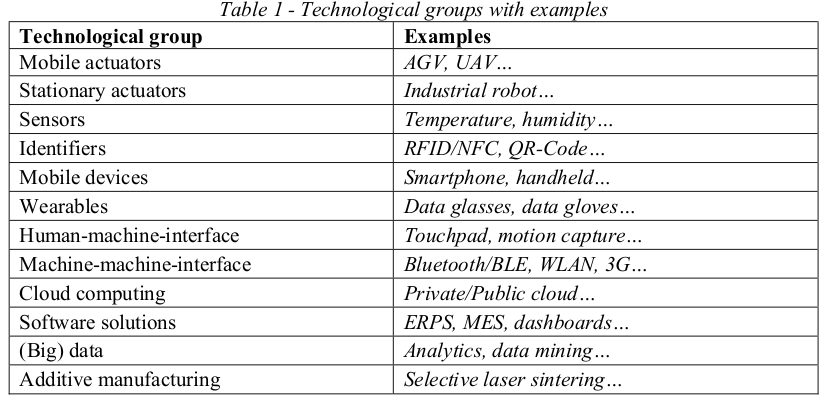
Manuel Zimmermann; Oliver Antons; Julia C. Bendul
Determinants of risk factors and benefits associated with Industry 4.0 technologies: Insights from German cases Proceedings Article
In: EurOMA19, 2019.
Abstract | BibTeX | Tags: Digitalization, Industry 4.0, Risk management
@inproceedings{Zimmermann-2019-ID693,
title = {Determinants of risk factors and benefits associated with Industry 4.0 technologies: Insights from German cases},
author = {Manuel Zimmermann and Oliver Antons and Julia C. Bendul},
year = {2019},
date = {2019-01-01},
urldate = {2019-01-01},
booktitle = {EurOMA19},
abstract = {This study investigates the application of current Industry 4.0 technologies as measures to counteract risk factors within companies and supply chains. Drawing on a database of more than 300 Industry 4.0 projects all around Germany, this study not only empirically explores which technologies and risk factors are currently relevant among practitioners \textendash but also evaluates the applicability of various technological solutions for the purpose of mitigating existing supply chain risks.},
keywords = {Digitalization, Industry 4.0, Risk management},
pubstate = {published},
tppubtype = {inproceedings}
}